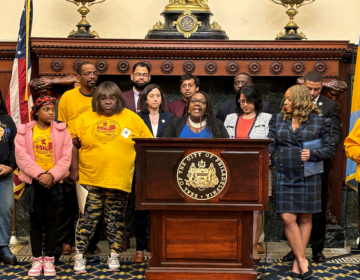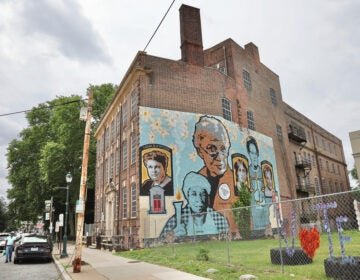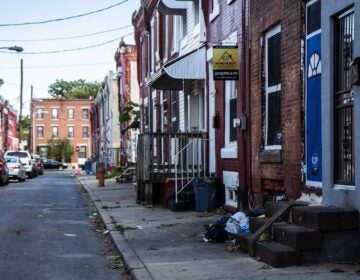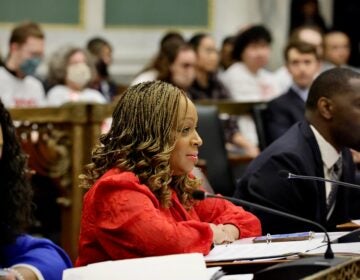City Council advances bill to make Philly’s Eviction Diversion Program permanent
The heralded program is scheduled to expire at the end of June if the measure doesn’t become law.
Listen 1:00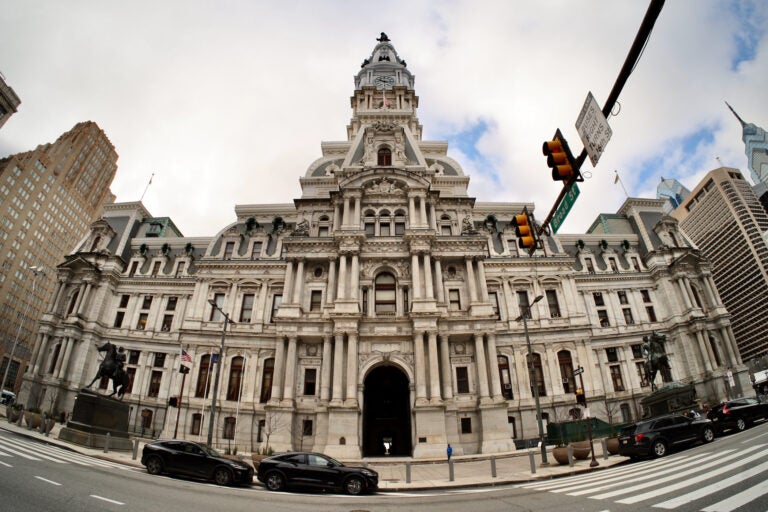
North Broad Street side of Philadelphia City Hall. (Emma Lee/WHYY)
Have a question about Philly’s neighborhoods or the systems that shape them? PlanPhilly reporters want to hear from you! Ask us a question or send us a story idea you think we should cover.
Mercedes Peterson thought things were under control.
After losing her job last summer, she used her unemployment checks to cover her monthly rent in Southwest Philadelphia. A few months later, she found a new position and was seemingly back on stable financial ground.
But shortly after she started working again, Peterson said she became “seriously ill.”
She went on to spend the next month in and out of the hospital and lost her job as a result.
She fell behind on rent, leading her landlord to send her an eviction notice.
“Thinking I would be put in the streets didn’t help my blood pressure,” Peterson said during a City Council hearing on Wednesday.
She said she was able to stay in her place thanks to the city’s mandatory Eviction Diversion Program, which requires landlords to try to resolve disputes with tenants outside of court.
With the help of a housing counselor, Peterson negotiated a payment agreement with her landlord for the $1,600 she owed in back rent.
She cleared the debt a few days ago.
“Sometimes people are down on their luck, but a helping hand goes a long way,” she said.
Peterson shared her story with the Council’s Committee on Housing, Neighborhood Development, and the Homeless. After roughly two hours of testimony, the committee advanced a measure that would make the diversion program permanent.
The program is slated to sunset at the end of June.
Housing advocates say the pandemic-inspired initiative is still needed in a city that continues to experience an affordable housing crisis, where thousands of residents are cost-burdened by rising rents and there is a limited supply of affordable units.
Since 2020, more than 7,000 landlord-tenant pairs have participated in mediation during various versions of the program, according to the city. Approximately 70% of them have reached an agreement without an eviction filing, which often makes it harder for tenants to find safe and affordable housing in the future regardless of the outcome.
While eviction filings have returned to pre-pandemic levels in cities around the country, that has not happened in Philadelphia, largely because of the diversion program, now considered a national model.
“When coupled with rental assistance, the Eviction Diversion Program is one of our city’s most effective anti-displacement programs ever,” said Councilmember Jamie Gauthier, who co-introduced the bill in April. “We cannot standby and let the eviction floodgates reopen.”
A veto-proof majority of Council has already signaled support for the measure, making it likely the bill will pass the full body and head to Mayor Cherelle Parker’s desk for a signature.
During Wednesday’s hearing, Mark Dodds, interim deputy director of the city’s Division of Housing and Community Development, testified that the Parker administration supports the program becoming the law of the land.
“It represents a hands-on effort by the city to help landlords and tenants in every Council district avoid the cost and disruptions of the eviction process,” Dodds said.
The bill is part of a platform aimed at helping Philadelphia renters and homeowners with low incomes keep a roof over their heads.
Dubbed “Our Philly Neighborhoods,” the campaign also calls for $100 million for the Targeted Financial Assistance program over the next two years. Under the initiative, landlords can receive a one-time payment to cover a tenant’s total back rent plus one month’s rent.
“Our Philly Neighborhoods” also seeks to permanently freeze property taxes for homeowners with low incomes, automate enrollment in tax exemption programs and expand home repair programs offered by the city.
Over the past two years, the TFA program has allocated $30 million for rental assistance. Parker’s first budget proposal does not include any new money from the general fund for the program in the fiscal year beginning July 1, meaning the $100 million request would need to be negotiated with Council.
On Wednesday, property owners voiced support for the rental assistance program, calling it a critical component of the Eviction Diversion Program. Abraham Silber, founder of Two River Development, said dozens of tenants have been able to continue renting from his company after taking advantage of the program.
“TFA has proven to be the lifeline that those of us in the affordable housing business know tenants need to get back on track,” Silber said.
HAPCO Philadelphia, the city’s largest advocacy group for landlords and property managers, has raised concerns about the Eviction Diversion Program. President Greg Wertman has said it should be voluntary and have a better mechanism for enforcing agreements reached through mediation.

Subscribe to PlanPhilly
WHYY is your source for fact-based, in-depth journalism and information. As a nonprofit organization, we rely on financial support from readers like you. Please give today.




